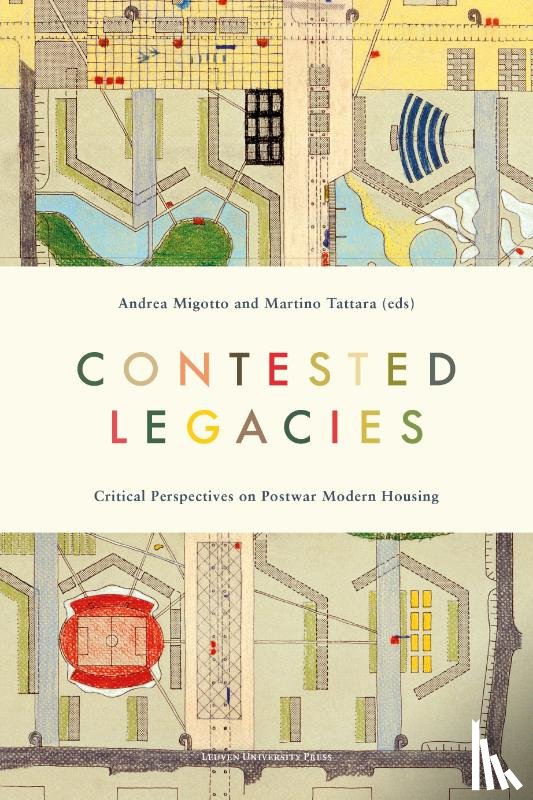Omschrijving
New insights on the controversial and often-overlooked postwar large-scale housing estates In the light of the current housing and environmental crisis and increasing social inequalities, there is a growing sense of urgency for architecture as a discipline to engage with the transformation in housing evident in the postwar period. Rather than conceiving this task as a technical matter, this book proposes to reassess the conditions and legacy of this large and ubiquitous housing stock. By foregrounding the mismatch between constructed cultural, social and ideological narratives and the everyday realities of residents, the contributors rediscover the value of often-overlooked modern open spaces and reconsider the technological advances that paved the way for this large-scale construction.
Contested Legacies advances a new notion of heritage which, rather than seeking to preserve the past, sets outs to actively transform what exists to meet current societal needs. It offers an ‘atlas’ of exemplary cases, each illustrating a defining yet often neglected aspect of modern postwar housing, from which present engagement and active reflection can grow, making the book an appealing read for both scholars and housing practitioners worldwide. In the light of the current housing and environmental crisis and increasing social inequalities, there is a growing sense of urgency for architecture as a discipline to engage with the transformation in housing evident in the postwar period. Rather than conceiving this task as a technical matter, this book proposes to reassess the conditions and legacy of this large and ubiquitous housing stock. By foregrounding the mismatch between constructed cultural, social and ideological narratives and the everyday realities of residents, the contributors rediscover some of the tropes of modern housing, such as the impact of technological innovations or the often overlooked character of open spaces, and unveil the intellectual and practical tools that paved the way for this large-scale construction.
Contested Legacies advances a new notion of heritage which, rather than seeking to preserve the past, sets outs to actively transform what exists to meet current societal needs. It offers an ‘atlas’ of exemplary cases, each illustrating a defining yet often neglected aspect of modern postwar housing, from which present engagement and active reflection can grow, making the book an appealing read for both scholars and housing practitioners worldwide. INTRODUCTION. THE PAST AND FUTURE OF POSTWAR HOUSING ESTATES: FACTS, HERITAGE, PROJECT
Andrea Migotto and Martino Tattara
PART 1. THE MODERN HOUSING PROJECT IS A SOCIAL PROJECT: A CRITICAL READING
CHAPTER 1. SOCIAL HOUSING AND THE REGIMES OF TIME: A FEW MOMENTS WITHIN THE LONG LINES OF (SOCIAL) HOUSING IN VIENNA AND AUSTRIA
Michael Klein
CHAPTER 2. TOO BIG? DEBUNKING SCALE MYTHS WITH THE LONDON COUNTY COUNCIL ARCHITECT’S DEPARTMENT
Jesse Honsa
CHAPTER 3. A SOCIAL CRITIQUE OF THE LARGE-SCALE MODERN HOUSING PROJECT
Martino Tattara
PART 2. INTERPRETATIONS OF THE ‘UNBUILT’ SPACE: FORMS, CATEGORIES, AND TERMS
CHAPTER 4. BELOW THE SHADOWS
Federico Coricelli and Nicola Russi
CHAPTER 5. THE COMMON SPACE PROJECT: THE CASE OF LATIN AMERICAN NEIGHBOURHOOD UNITS
Umberto Bonomo
PART 3. AGENTS MEAN HISTORIES: ACCOUNTING FOR MULTIPLE EXPERIENCES AND AGENCIES IN POSTWAR HOUSING ESTATES
CHAPTER 6. LIVING TOGETHER: (THE MULTIPLE) ‘STORIES’ OF AN ORDINARY HOUSING DEVELOPMENT IN POST-WWII TURIN
Gaia Caramellino
CHAPTER 7. GOSSIP AND COMPLAINT: WAYS OF (RE-)PRODUCING THE SOCIAL IN HOUSING ‘EXPERTLY’
Heidi Svenningsen Kajita
PART 4. CULTURES OF TRANSFORMATION
CHAPTER 8. HOUSING COMPLEXES IN BRAZIL: A MODERNIST HERITAGE
Flávia Brito do Nascimento
CHAPTER 9. MODERNISM IS DEAD, LONG LIVE MODERNITY: THE BIJLMER AND THE PROJECT OF ‘INCOMPLETENESS’
Andrea Migotto
ABOUT THE AUTHORS


